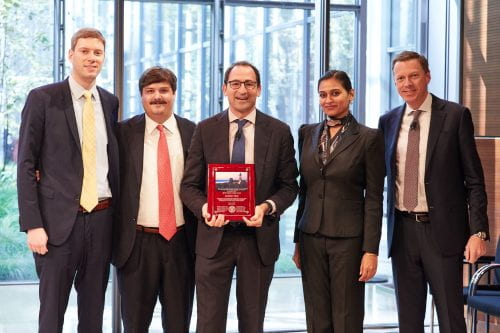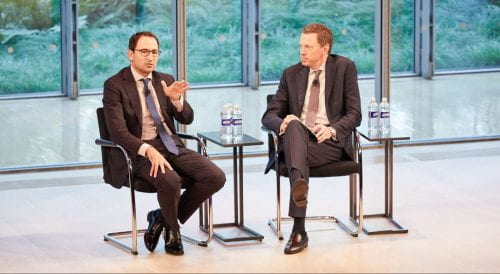
Since 2007, the editors of the Cornell Real Estate Review have annually recognized exceptional real estate professionals to receive the prestigious “Industry Leader Award.” Recipients of this award are individuals who have made significant contributions to the global real estate industry while serving their community. This year the award was presented to Jonathan Gray, President and Chief Operating Officer of Blackstone Group and Chairman of the Board of Hilton Worldwide.
Gray completed his undergraduate education at the University of Pennsylvania where he studied Economics at the Wharton School of Business and English in the College of Arts and Sciences. During his remarkable career at Blackstone, he has played an instrumental role in transforming the firm into one of the world’s leading investors in alternative investments. In particular, Gray has revolutionized real estate by building the world’s largest investment platform through Blackstone’s buy-fix-sell strategy, frequently making unconventional bets that contradict industry consensus. In addition, together with his wife, Mindy, he has made significant charitable contributions to cancer research and has facilitated increased access to education for low-income children in New York City.
Following the award ceremony, Gray was joined for a one-on-one discussion with Kevin Jacobs (SHA ’94), Executive Vice President and Chief Financial Officer of Hilton Worldwide. Their conversation revealed insights into real estate trends, decision-making, and leadership, and provided invaluable advice to young members of the audience.
An asset’s quality is a more important consideration than the timing of the investment, according to Gray, and he further explained that sticking to the business plan is essential in the long-run as the economy experiences cyclical ups and downs. It is this philosophy that has allowed him to make sound investments with conviction, even under difficult economic conditions. For example, during the global financial crisis, Blackstone’s leadership believed in the company’s assets and strategy and stuck with them, even when other investors wanted to cash out. Blackstone has reaped enormous growth and profits as a result. This important lesson is one to remember, especially in a late cycle economy.
Gray believes in the importance of chasing excellence and striving for greatness through hard work. He remained humble when asked by Jacobs how a young boy from the Chicago suburbs became the President and COO of Blackstone, replying that it was the result of “a good education, hard work, a strong support system and a little bit of luck—being in the right place at the right time.” While reminiscing about his time at Penn, he recalled meeting a young woman in a romantic poetry class who encouraged him to join a 75-person investment firm in New York. That firm is, of course, Blackstone, which has now grown into a world-class 2,500-employee company, and that woman is his wife.
While discussing forthcoming trends, Gray predicted that e-commerce will continue to dominate and forecasted a troubled time for physical retailers, with the exception of those with sufficient space allocated to entertainment, food and beverage, and showrooms. Furthermore, he predicted that large box format retailers will suffer the most since they fail to provide unique consumer experiences.
Gray also remarked that companies move where knowledge workers are located. He noted that job creation is occurring most strongly on the west coast with innovative technology and creative knowledge workers drawn to cities in states like Washington and California, making these areas attractive for investment. He clarified, however, that there are some exceptions to this rule such as Raleigh-Durham, Brooklyn, and Austin. He also mentioned international regions with similar clustered labor pools of knowledge workers including Schengen, Bangalore, and Scandinavia.
Gray shared with the audience some of the lessons he has learned in the real estate industry during his career. Most recently, he has been reading about energy, media and pharmaceuticals and believes that big trends cut across industries. For example, Blackstone bought office buildings in Burbank, CA—a content creation hub—as he believes in the long-term success of real estate related to media. The distribution methods of media may evolve, but the creation of content in that larger geographical area will remain.
Furthermore, he explained that investing in emerging markets can be difficult as macro trends are just as important to consider as micro factors. Mega trends can present risks that are not apparent at the micro level. Currently, he sees good opportunities in India, thanks to its increasing consumer base and strong IT industry, and he noted that Blackstone is the largest owner of office buildings in India.
When asked about his new role evaluating investment opportunities outside the real estate industry, Gray stated that companies with low capital expenditures grow quickly and make the best investments. Although private organizations can become bureaucratic and employees can get siloed into specialized departments, he explained that the mere scale of the private market allows for high capital, systematic pattern recognition, and the ability to do what public markets cannot. As Blackstone grows, Gray is constantly trying to maintain the small business feel in its daily operations.
He attributes his success as a leader to the support from his wife and his team at work, emphasizing the importance of staying calm under pressure to do the best job for investors. This strong support system, according to Gray, has carried him through crises that can at times seem overwhelming. In order to keep employee confidence high during tough times, he thinks it is imperative that a leader stay calm and show his commitment to the company’s long-term mission. His approach to work-life balance is “all integrated.” He makes it a point to attend his daughters’ games and be present in the moment, and he also occasionally brings them along to view real estate projects.
Gray advised students in the audience to be consumers of information by reading newspapers, analyst’s reports, company reports, and transcripts of earnings calls. He urged the audience to travel, talk to people, and avoid following the consensus. A willingness to be educated and a conviction in one’s opinions, according to Gray, will allow one to succeed in business. His biggest career advice was to love what you do. He encouraged young members of the audience to find good mentors, be passionate about work, and to believe in the mission of the company. He stressed the importance of a good education and commended Cornell for providing students with a competitive advantage through innovation and interdisciplinary skills.

